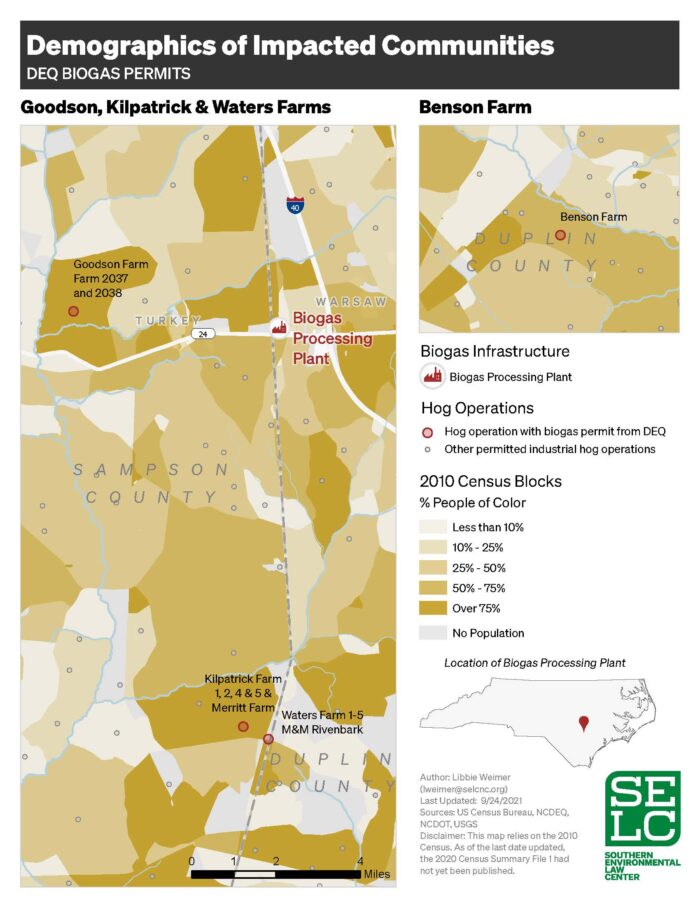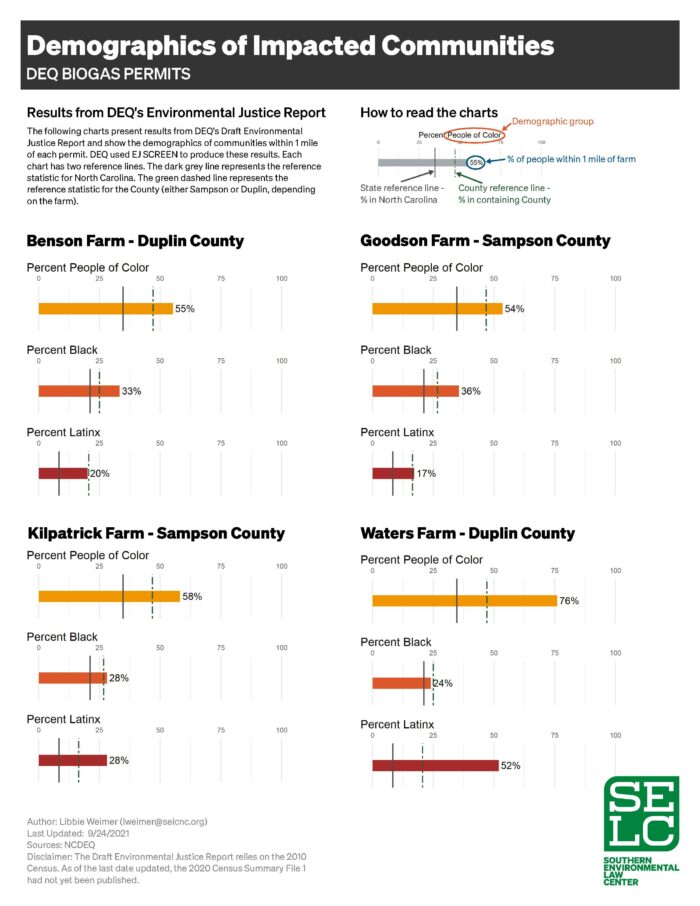Civil rights filing alleges discriminatory harm in industrial hog operations permits
A complaint SELC filed with the Environmental Protection Agency, on behalf of the Duplin County Branch of the North Carolina Conference of the NAACP and the North Carolina Poor People’s Campaign, alleges the North Carolina Department of Environmental Quality violated Title VI of the Civil Rights Act of 1964 in issuing permits to industrial hog producer Murphy Brown. The state issued permits to four hog operations, which are operated by a subsidiary of Smithfield Foods, will have a disproportionate impact on Black and Latinx communities in rural eastern North Carolina.
“A primary objective of the association is to seek the enactment and enforcement of federal, state, and local laws securing civil rights,” said Robert Moore, president of the Duplin County Branch of the North Carolina Conference of the NAACP. “Although we understand that the pork industry is important, researchers have repeatedly found that pollution from the state’s industrial hog operations disproportionately affect African Americans, Hispanics, and Native Americans in a pattern that they concluded, ‘is generally recognized as environmental racism.’ For too long, the Department of Environmental Quality has turned a blind eye to what the hog industry is doing to communities of color in North Carolina. Now it’s time for EPA and Administrator Regan to follow through on their commitment to environmental justice for communities in eastern North Carolina.
The permits at issue allow Smithfield to capture gases from giant pits of hog waste—a process that increases harmful ammonia emissions—pump the more harmful waste into open air pits, and spray the sewage onto nearby fields, all of which pollutes the air and water and harms people’s health. The state permits continue a long history of pollution and harm to the families – disproportionately Black, Latinx, and Native American families – living nearby. Duplin and Sampson Counties, where the four hog operations are located, have the highest concentration of hog operations in the United States.
“True solutions to our climate crisis are those that protect the most vulnerable communities,” said William Barber, III with the N.C. Poor People’s Campaign. “Smithfield is doubling down on the cheapest and most harmful method possible for storing billions of gallons of hog waste without addressing the added harm to communities. These North Carolina permits to the hog industry continue a legacy of burdening communities of color with sickness and pollution.”
Ignoring long-standing environmental justice and pollution concerns, the four permits issued by the state Department of Environmental Quality entrench a primitive waste lagoon and sprayfield system at each of the Smithfield-owned operations, where untreated sewage waste from thousands of animals is collected in large pits and sprayed onto fields.
“North Carolina’s environmental agency and powerful hog industry continue to ignore the harm to people’s health, air quality and water quality from these primitive lagoons full of hog waste that is then sprayed on nearby fields,” said SELC attorney Blakely Hildebrand. “Making this pollution problem worse is unacceptable. We’re asking the EPA to right this wrong and put action behind its words to stop environmental injustice.”
The permits do not resolve harmful water pollution from the hog operations, and may make these problems worse. Capping a hog waste lagoon produces more ammonia emissions than a conventional hog waste lagoon and increases the risk of water and air pollution, and adverse human health impacts. The families living nearby these hog operations are predominantly Black and Latinx; these communities disproportionately bear the burden of pollution from these industrial hog operations.


Other waste management technologies address these concerns and have been implemented at other hog operations, but have not been widely adopted by the hog industry.
The state agency is a recipient of federal funds, and as such must comply with Title VI of the Civil Rights Act of 1964. Title VI prohibits agencies receiving federal funds from discriminating on the basis of race; this prohibition includes agency actions that have a discriminatory effect on people of color.
On behalf of Environmental Justice Community Action Network and Cape Fear River Watch, SELC challenged the four permits in the N.C. Office of Administrative Hearings on the grounds that the state agency failed to identify and require cleaner technology to manage hog waste or to evaluate and address the effect of its permitting decisions on water quality, both of which are mandated by state law. This litigation is ongoing.
Earlier this year in the North Carolina legislature, Smithfield wielded its political power to make it easier for hog operations to get approval to produce biogas and, in the process, limited opportunities for impacted communities to voice concerns. This action follows rollbacks of nuisance laws, resulting in restricted rights for neighbors of industrial hog operations to seek redress from the loss of use of their property due to pollution and noxious odors.
